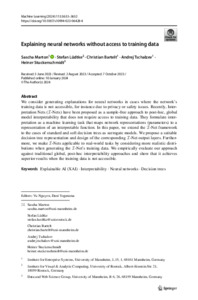|
Explaining neural networks without access to training data
Marton, Sascha
;
Lüdtke, Stefan
;
Bartelt, Christian
;
Tschalzev, Andrej
;
Stuckenschmidt, Heiner
![[img]](https://madoc.bib.uni-mannheim.de/66392/1.hassmallThumbnailVersion/s10994-023-06428-4-1.pdf)  Vorschau |
|
PDF
s10994-023-06428-4-1.pdf
- Veröffentlichte Version
Download (2MB)
|
|
DOI:
|
https://doi.org/10.1007/s10994-023-06428-4
|
|
URL:
|
https://link.springer.com/article/10.1007/s10994-0...
|
|
Weitere URL:
|
https://arxiv.org/abs/2206.04891
|
|
URN:
|
urn:nbn:de:bsz:180-madoc-663926
|
|
Dokumenttyp:
|
Zeitschriftenartikel
|
|
Erscheinungsjahr:
|
2024
|
|
Titel einer Zeitschrift oder einer Reihe:
|
Machine Learning
|
|
Band/Volume:
|
113
|
|
Heft/Issue:
|
6
|
|
Seitenbereich:
|
3633-3652
|
|
Ort der Veröffentlichung:
|
Dordrecht [u.a.]
|
|
Verlag:
|
Springer
|
|
ISSN:
|
0885-6125 , 1573-0565
|
|
Sprache der Veröffentlichung:
|
Englisch
|
|
Einrichtung:
|
Fakultät für Wirtschaftsinformatik und Wirtschaftsmathematik > Practical Computer Science II: Artificial Intelligence (Stuckenschmidt 2009-)
Außerfakultäre Einrichtungen > Institut für Enterprise Systems (InES)
|
|
Bereits vorhandene Lizenz:
|
 Creative Commons Namensnennung 4.0 International (CC BY 4.0) Creative Commons Namensnennung 4.0 International (CC BY 4.0)
|
|
Fachgebiet:
|
004 Informatik
|
|
Freie Schlagwörter (Englisch):
|
explainable Artificial Intelligence (xAI) , machine learning , Artificial Intelligence , decision trees
|
|
Abstract:
|
We consider generating explanations for neural networks in cases where the network's training data is not accessible, for instance due to privacy or safety issues. Recently, Interpretation Nets (I-Nets) have been proposed as a sample-free approach to post-hoc, global model interpretability that does not require access to training data. They formulate interpretation as a machine learning task that maps network representations (parameters) to a representation of an interpretable function. In this paper, we extend the I-Net framework to the cases of standard and soft decision trees as surrogate models. We propose a suitable decision tree representation and design of the corresponding I-Net output layers. Furthermore, we make I-Nets applicable to real-world tasks by considering more realistic distributions when generating the I-Net's training data. We empirically evaluate our approach against traditional global, post-hoc interpretability approaches and show that it achieves superior results when the training data is not accessible.
|
 | Dieser Eintrag ist Teil der Universitätsbibliographie. |
 | Das Dokument wird vom Publikationsserver der Universitätsbibliothek Mannheim bereitgestellt. |
 Suche Autoren in Suche Autoren in
BASE:
Marton, Sascha
;
Lüdtke, Stefan
;
Bartelt, Christian
;
Tschalzev, Andrej
;
Stuckenschmidt, Heiner
Google Scholar:
Marton, Sascha
;
Lüdtke, Stefan
;
Bartelt, Christian
;
Tschalzev, Andrej
;
Stuckenschmidt, Heiner
ORCID:
Marton, Sascha  ORCID: 0000-0001-8151-9223 ORCID: 0000-0001-8151-9223 ; Lüdtke, Stefan ; Bartelt, Christian ; Tschalzev, Andrej  ORCID: 0000-0002-0638-5744 ORCID: 0000-0002-0638-5744 ; Stuckenschmidt, Heiner  ORCID: 0000-0002-0209-3859 ORCID: 0000-0002-0209-3859
Sie haben einen Fehler gefunden? Teilen Sie uns Ihren Korrekturwunsch bitte hier mit: E-Mail
Actions (login required)
 |
Eintrag anzeigen |
|
|
 ORCID: 0000-0001-8151-9223 ; Lüdtke, Stefan ; Bartelt, Christian ; Tschalzev, Andrej
ORCID: 0000-0001-8151-9223 ; Lüdtke, Stefan ; Bartelt, Christian ; Tschalzev, Andrej  ORCID: 0000-0002-0638-5744 ; Stuckenschmidt, Heiner
ORCID: 0000-0002-0638-5744 ; Stuckenschmidt, Heiner  ORCID: 0000-0002-0209-3859
ORCID: 0000-0002-0209-3859



 Creative Commons Namensnennung 4.0 International (CC BY 4.0)
Creative Commons Namensnennung 4.0 International (CC BY 4.0) Suche Autoren in
Suche Autoren in